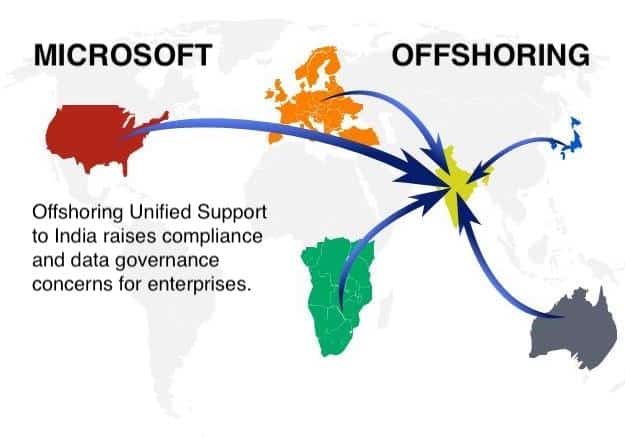

Offshoring in Unified Support Delivery: A Look at Data Governance and Compliance.
Offshoring in Unified Service Delivery: A Look at Data Governance and Compliance
Offshoring has become a common practice in the tech industry, greatly reducing labor costs and facilitating 24/7 response times for customer support. Microsoft Unified Support, the company’s premium support option for enterprises, is no stranger to this trend, employing technicians from overseas countries like India to handle support tickets around the clock. While this approach has its benefits, it also raises serious questions regarding compliance risks, especially when dealing with sensitive support logs and infrastructure data.

Data Protection and Prompt Resolutions
In a fast-paced digital world, support hours are invaluable. When issues arise, businesses expect prompt resolutions. Microsoft’s offshoring practice theoretically enables this quick response by tapping into global work hours. A late-night ticket in the U.S. can be handled by someone in India, where it’s normal work hours. However, this “rapid response” comes with a risk.
The offshoring model, while efficient, introduces potential compliance risks. These arise from the use of “foreign nationals” who may not operate under the strict compliance norms followed within the U.S. Also seen as v dash vendors, since their email addresses have a v dash in front of them, these individuals are part of a wider network of engineers operating overseas to handle the infrastructural strain of so many incoming tickets. The issue is that since they aren’t beholden to the same data compliance as support services in the US, there is a greater chance, however small, that your data could fall into the wrong hands.
Lack of Oversight
Outsourced IT operations from overseas entities inherently have less oversight. The strict protocols and regulations followed by domestically sourced engineers aren’t as rigorously applied with foreign technicians, leaving sensitive data in a potential mire.
Risk of Data Leaks
While the chances of Unified support data being leaked are low, the mere possibility indicates that the data is not being handled with the utmost care and compliance in mind. With someone outside U.S. laws handling sensitive data, the risk profile changes. Mitigating the possibly of data breaches comes with the compliance territory.
Data Compliance and Sovereignty Concerns
The concern extends beyond the personnel to the data itself. Microsoft does not contractually guarantee that a domestic U.S. person will handle all Unified support tickets, nor that sensitive system logs and infrastructure data will remain within the U.S. Your data security is entirely up to Microsoft and overseas management at that point.
Ideally, data should stay within the Country of Origin (COI), or at least in the country where the service delivery engineers are located. The lack of such guarantees raises flags, especially for industries that are highly regulated or susceptible to industrial espionage, such as energy, auto, banking, pharma, communications, manufacturing, utility, transportation, construction, maritime, government, IT, and education. Businesses in these sectors stand to lose more than just money through a data breach due to lacking data security.
Secure IT Supply Chains and Data Protection
These sectors must consider securing their IT supply chain more tightly by selecting a Microsoft Enterprise Support vendor that can contractually guarantee the sovereignty of both support data and personnel. This ensures that only those individuals working closely with internal IT teams have access to critical data.
Awareness and Compliance Risk
A large part of the problem is a lack of awareness. Many organizations remain unaware of the compliance risk created by support data flowing overseas, don’t care, or don’t have a full understanding of the ramifications these regulatory compliance mishaps can cause. Risk management teams may fail to take protective measures, and compliance teams may falsely assume safety from industry fines and damaging headlines. While you shouldn’t assume the worst, there should be a greater degree of care around your data management.
A Call for Greater Data Governance and Compliance
Offshoring in Unified service delivery undoubtedly brings efficiencies and benefits, but it is not without risks. The concerns related to compliance, data sovereignty, and the employment of foreign nationals in handling sensitive information necessitate greater vigilance and caution.
Enterprises must recognize the potential threats and carefully weigh their options. This might include demanding contractual guarantees about who handles their support tickets and where the data resides. More importantly, there is a need for broader awareness and education around this issue so that organizations can make informed decisions and take proactive steps to ensure compliance.
The use of offshore support in Unified service delivery is not inherently bad, but it should be handled with care and foresight. Careful selection of vendors, strict adherence to regulations, and enhanced security protocols are essential to maintain trust and integrity in this essential aspect of business operations. You’re also paying for a service, so the inherent value should include the value of risk prevention and data privacy.
As businesses continue to globalize and technology evolves, the balance between efficiency and security will remain a vital consideration. The offshoring of Unified service delivery is a microcosm of this larger trend, and the lessons learned here can serve as a blueprint for broader industry practices.
